-
 Bitcoin
Bitcoin $108,165.4587
0.78% -
 Ethereum
Ethereum $2,456.3517
1.15% -
 Tether USDt
Tether USDt $1.0003
0.00% -
 XRP
XRP $2.1934
0.05% -
 BNB
BNB $650.0935
0.52% -
 Solana
Solana $151.3905
2.69% -
 USDC
USDC $0.9998
0.00% -
 TRON
TRON $0.2751
-0.32% -
 Dogecoin
Dogecoin $0.1640
0.87% -
 Cardano
Cardano $0.5631
0.57% -
 Hyperliquid
Hyperliquid $38.7115
4.69% -
 Bitcoin Cash
Bitcoin Cash $493.1868
-0.39% -
 Sui
Sui $2.8217
3.61% -
 Chainlink
Chainlink $13.3994
2.08% -
 UNUS SED LEO
UNUS SED LEO $9.1632
0.94% -
 Avalanche
Avalanche $18.0318
1.97% -
 Stellar
Stellar $0.2388
0.35% -
 Toncoin
Toncoin $2.8763
1.41% -
 Shiba Inu
Shiba Inu $0.0...01160
1.59% -
 Litecoin
Litecoin $86.6393
1.29% -
 Hedera
Hedera $0.1485
0.16% -
 Monero
Monero $315.7948
1.56% -
 Polkadot
Polkadot $3.4240
1.88% -
 Bitget Token
Bitget Token $4.6314
-0.44% -
 Dai
Dai $0.9998
-0.01% -
 Ethena USDe
Ethena USDe $1.0002
-0.01% -
 Uniswap
Uniswap $7.2110
2.59% -
 Aave
Aave $270.6087
6.07% -
 Pi
Pi $0.5350
0.52% -
 Pepe
Pepe $0.0...09545
1.26%
How to exchange Bitcoincoin for Bitcoin? Detailed steps for coin-to-coin trading
To exchange Dogecoin for Bitcoin, choose a secure exchange like Binance or Coinbase, set up an account with 2FA, deposit DOGE, trade for BTC, and withdraw to a personal wallet.
May 11, 2025 at 07:49 pm

Exchanging Dogecoin for Bitcoin is a common transaction within the cryptocurrency space, and it can be accomplished through various methods. This article will guide you through the detailed steps of coin-to-coin trading using popular cryptocurrency exchanges. Understanding the process and the tools involved is crucial for a smooth and secure transaction.
Choosing a Cryptocurrency Exchange
The first step in exchanging Dogecoin for Bitcoin is selecting a suitable cryptocurrency exchange. Popular exchanges like Binance, Coinbase, and Kraken support trading pairs between Dogecoin and Bitcoin. When choosing an exchange, consider factors such as:
- Security features offered by the platform.
- Trading fees and any other associated costs.
- User interface and ease of use.
- Liquidity for the DOGE/BTC trading pair.
Once you have chosen an exchange, you will need to create an account and complete the necessary verification processes.
Setting Up Your Account
To set up your account on the chosen exchange, follow these steps:
- Visit the exchange's website and click on the "Sign Up" or "Register" button.
- Enter your personal details such as your name, email address, and a strong password.
- Complete the verification process, which may require submitting identification documents like a passport or driver's license.
- Enable two-factor authentication (2FA) for added security. This can usually be done through an authenticator app or SMS.
Once your account is set up and verified, you can proceed to deposit your Dogecoin.
Depositing Dogecoin
To deposit Dogecoin into your exchange account, follow these steps:
- Navigate to the "Deposit" or "Wallet" section of the exchange.
- Select Dogecoin from the list of available cryptocurrencies.
- Generate a new Dogecoin deposit address or use an existing one provided by the exchange.
- Copy the deposit address and use it to send your Dogecoin from your personal wallet to the exchange.
Ensure that you double-check the deposit address to avoid any errors. Once the transaction is confirmed on the Dogecoin blockchain, your balance will be updated on the exchange.
Trading Dogecoin for Bitcoin
With your Dogecoin deposited, you can now proceed to trade it for Bitcoin. Here are the steps to follow:
- Navigate to the trading section of the exchange and find the DOGE/BTC trading pair.
- Place an order to exchange your Dogecoin for Bitcoin. You can choose between a market order, which will execute at the current market price, or a limit order, which allows you to set a specific price.
- Review your order and confirm the transaction.
Once your order is executed, your Bitcoin balance will be updated, and you can view it in your exchange wallet.
Withdrawing Bitcoin
After successfully trading your Dogecoin for Bitcoin, you may want to withdraw your Bitcoin to a personal wallet for added security. Here's how to do it:
- Navigate to the "Withdraw" or "Wallet" section of the exchange.
- Select Bitcoin from the list of available cryptocurrencies.
- Enter the amount of Bitcoin you wish to withdraw and the address of your personal Bitcoin wallet.
- Review the withdrawal details and confirm the transaction.
Be aware that withdrawal fees may apply, and the transaction may take some time to be confirmed on the Bitcoin blockchain.
Frequently Asked Questions
Q: Can I exchange Dogecoin for Bitcoin on decentralized exchanges (DEX)?
A: Yes, you can exchange Dogecoin for Bitcoin on decentralized exchanges like Uniswap or SushiSwap. The process involves connecting your wallet to the DEX, selecting the DOGE/BTC trading pair, and executing a swap. However, ensure that the DEX supports the DOGE/BTC pair and that you understand the potential risks associated with decentralized trading.
Q: What are the tax implications of exchanging Dogecoin for Bitcoin?
A: The tax implications of exchanging Dogecoin for Bitcoin can vary depending on your jurisdiction. In many countries, cryptocurrency-to-cryptocurrency trades are considered taxable events, and you may need to report any gains or losses. It's advisable to consult with a tax professional to understand your specific obligations.
Q: Are there any risks associated with exchanging Dogecoin for Bitcoin?
A: Yes, there are risks involved in cryptocurrency trading. These include market volatility, potential security breaches on exchanges, and the risk of transaction errors. Always use reputable exchanges, enable security features like 2FA, and double-check all transaction details to minimize these risks.
Q: Can I use a peer-to-peer (P2P) platform to exchange Dogecoin for Bitcoin?
A: Yes, you can use P2P platforms like LocalBitcoins or Paxful to exchange Dogecoin for Bitcoin directly with other users. The process involves finding a suitable offer, agreeing on the terms, and completing the transaction. Be cautious when using P2P platforms, as they carry additional risks such as counterparty risk and potential scams.
Disclaimer:info@kdj.com
The information provided is not trading advice. kdj.com does not assume any responsibility for any investments made based on the information provided in this article. Cryptocurrencies are highly volatile and it is highly recommended that you invest with caution after thorough research!
If you believe that the content used on this website infringes your copyright, please contact us immediately (info@kdj.com) and we will delete it promptly.
- ATOM, BNB, BlockDAG: Decoding the Latest Crypto Dynamics in the Concrete Jungle
- 2025-06-30 01:30:11
- Bitcoin's Role in a Weak Dollar World: Crypto Demand and Freedom
- 2025-06-30 00:50:12
- Binance, CZ, and XRP: Navigating the Crypto Currents
- 2025-06-30 00:55:12
- PayPal, PYUSD, and Stellar (XLM:
- 2025-06-30 00:30:12
- Nike, Coinbase, and Large Cap Gainers: What's the Buzz?
- 2025-06-30 00:30:12
- Crypto's Cutting Edge: Web3 AI, Ethereum's Foundation, and Dogecoin's Enduring Meme Magic
- 2025-06-30 01:30:11
Related knowledge

How to extract the public key from a Bitcoincoin wallet address?
Jun 16,2025 at 07:49am
Understanding the Relationship Between a Dogecoin Address and Its Public KeyIn the world of Dogecoin (DOGE), users often interact with wallet addresses but rarely see the underlying cryptographic components such as the public key or private key. A Dogecoin address is derived from the public key through a series of hashing operations. Specifically, the p...
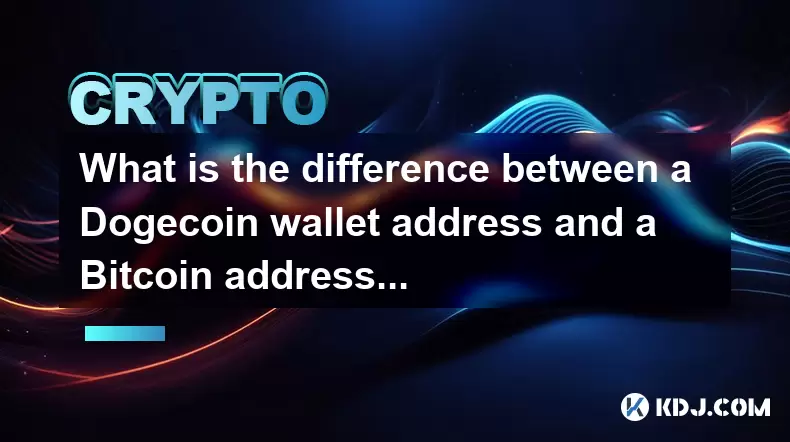
What is the difference between a Bitcoincoin wallet address and a Bitcoin address?
Jun 22,2025 at 10:28pm
Understanding the Fundamentals of Cryptocurrency AddressesIn the world of cryptocurrencies, wallet addresses serve as unique identifiers for users to send and receive digital assets. Each cryptocurrency typically has its own address format, which is derived from cryptographic algorithms and encoding methods. Both Dogecoin and Bitcoin utilize public-key ...
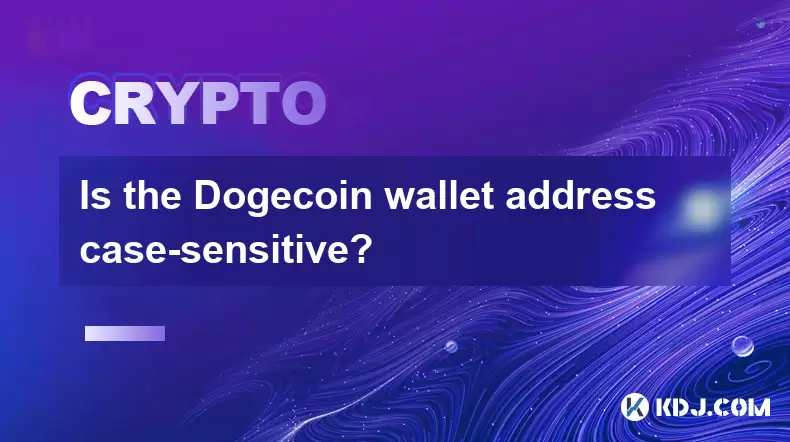
Is the Dogecoin wallet address case-sensitive?
Jun 15,2025 at 10:15pm
Understanding the Structure of a Dogecoin Wallet AddressA Dogecoin wallet address is a unique alphanumeric string used to receive and send DOGE. It typically starts with the letter 'D' and contains a combination of uppercase and lowercase letters along with numbers. The structure is based on cryptographic principles derived from public-key cryptography,...
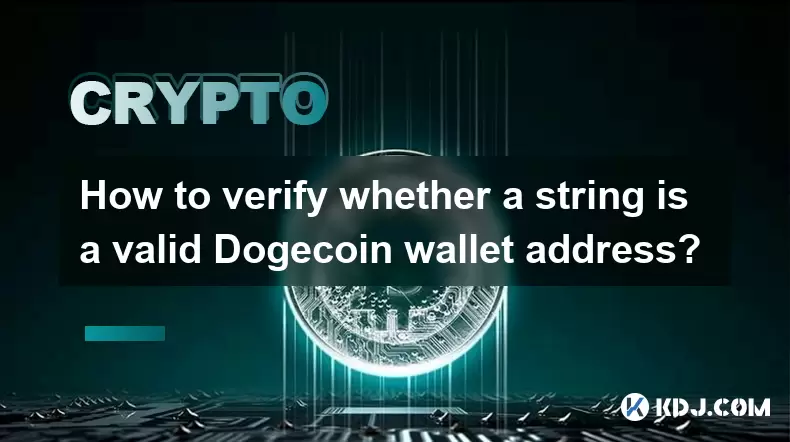
How to verify whether a string is a valid Bitcoincoin wallet address?
Jun 14,2025 at 01:57am
Understanding the Structure of a Dogecoin Wallet AddressA Dogecoin wallet address is typically composed of a combination of letters and numbers, starting with the letter 'D'. This structure follows the same format as other cryptocurrencies that use the Bitcoin protocol, but with specific prefixes unique to Dogecoin. The standard length for a Dogecoin ad...
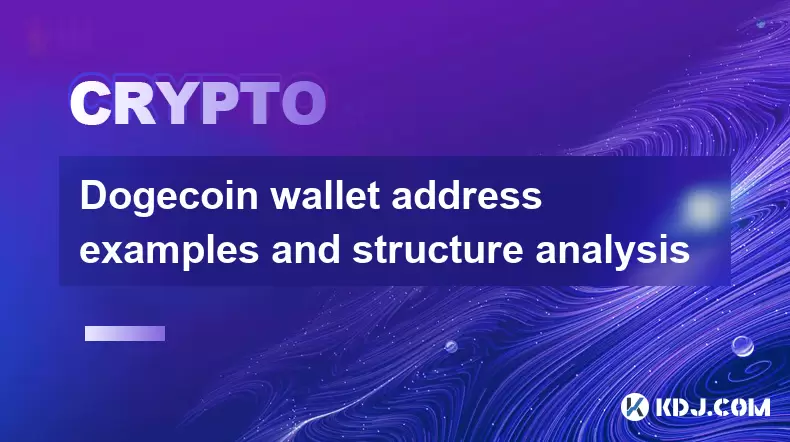
Dogecoin wallet address examples and structure analysis
Jun 13,2025 at 09:42pm
Understanding Dogecoin Wallet AddressesA Dogecoin wallet address serves as a unique identifier for receiving and sending DOGE. It functions similarly to a bank account number but is designed specifically for blockchain transactions. Each address consists of a combination of letters and numbers, typically starting with the letter 'D'. These addresses are...
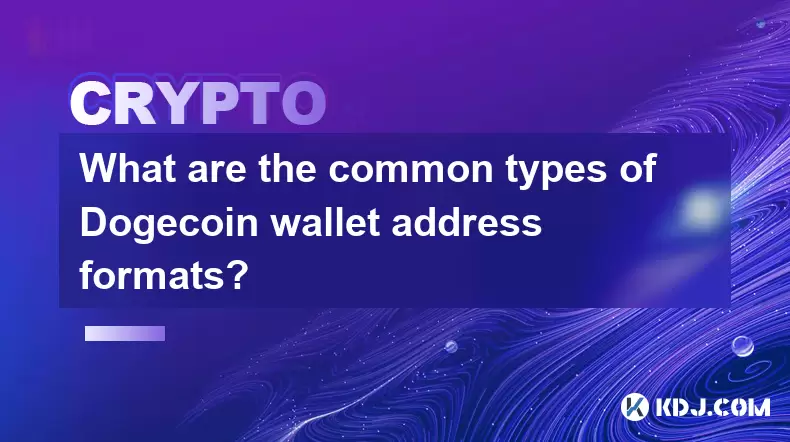
What are the common types of Dogecoin wallet address formats?
Jun 15,2025 at 08:21pm
Understanding Dogecoin Wallet AddressesDogecoin wallet addresses are alphanumeric strings used to send and receive DOGE. These addresses follow specific formats that define their structure and compatibility with different wallets and blockchain explorers. Understanding these formats is crucial for ensuring secure transactions and proper integration with...

How to extract the public key from a Bitcoincoin wallet address?
Jun 16,2025 at 07:49am
Understanding the Relationship Between a Dogecoin Address and Its Public KeyIn the world of Dogecoin (DOGE), users often interact with wallet addresses but rarely see the underlying cryptographic components such as the public key or private key. A Dogecoin address is derived from the public key through a series of hashing operations. Specifically, the p...

What is the difference between a Bitcoincoin wallet address and a Bitcoin address?
Jun 22,2025 at 10:28pm
Understanding the Fundamentals of Cryptocurrency AddressesIn the world of cryptocurrencies, wallet addresses serve as unique identifiers for users to send and receive digital assets. Each cryptocurrency typically has its own address format, which is derived from cryptographic algorithms and encoding methods. Both Dogecoin and Bitcoin utilize public-key ...

Is the Dogecoin wallet address case-sensitive?
Jun 15,2025 at 10:15pm
Understanding the Structure of a Dogecoin Wallet AddressA Dogecoin wallet address is a unique alphanumeric string used to receive and send DOGE. It typically starts with the letter 'D' and contains a combination of uppercase and lowercase letters along with numbers. The structure is based on cryptographic principles derived from public-key cryptography,...

How to verify whether a string is a valid Bitcoincoin wallet address?
Jun 14,2025 at 01:57am
Understanding the Structure of a Dogecoin Wallet AddressA Dogecoin wallet address is typically composed of a combination of letters and numbers, starting with the letter 'D'. This structure follows the same format as other cryptocurrencies that use the Bitcoin protocol, but with specific prefixes unique to Dogecoin. The standard length for a Dogecoin ad...

Dogecoin wallet address examples and structure analysis
Jun 13,2025 at 09:42pm
Understanding Dogecoin Wallet AddressesA Dogecoin wallet address serves as a unique identifier for receiving and sending DOGE. It functions similarly to a bank account number but is designed specifically for blockchain transactions. Each address consists of a combination of letters and numbers, typically starting with the letter 'D'. These addresses are...

What are the common types of Dogecoin wallet address formats?
Jun 15,2025 at 08:21pm
Understanding Dogecoin Wallet AddressesDogecoin wallet addresses are alphanumeric strings used to send and receive DOGE. These addresses follow specific formats that define their structure and compatibility with different wallets and blockchain explorers. Understanding these formats is crucial for ensuring secure transactions and proper integration with...
See all articles

























































































